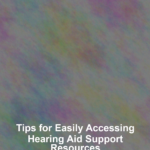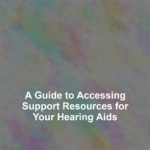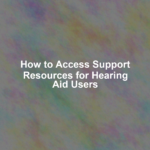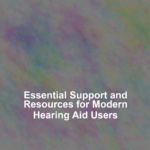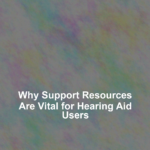Navigating the nuanced necessities of hearing aid support can seem daunting at first glance. YouG??re not alone in your quest for quality sound; numerous resources exist to enhance your experience and ensure your device meets your daily demands.
Whether youG??re facing technical troubles, searching for financial assistance, or simply seeking connection with others sharing similar experiences, understanding where and how to access these support services is pivotal.
As you contemplate the complexities of your hearing aid, remember that familiarizing yourself with the available support systems can transform your auditory adventure. Stay tuned to uncover the keys to unlocking the full potential of your device and the support that surrounds it.
Identifying Your Needs
Before exploring available resources, itG??s essential to pinpoint the specific challenges youG??re facing with your hearing loss. Recognizing whether youG??re struggling with daily communication, emotional impacts, or technical issues with your hearing aids is the first step. YouG??ll need to assess if your challenges are situational, like hearing in noisy environments, or constant, such as a persistent ringing in your ears.
YouG??ve got to consider your lifestyle too. Are you active and always on the go, or do you enjoy quieter, indoor activities? Your needs might differ greatly based on how you spend your days. For instance, you might require hearing aids with robust batteries and connectivity options if youG??re often outdoors or use various digital devices.
ItG??s also worth thinking about the support you already have. Are you looking for professional advice, or do you need more day-to-day support from peers who understand what youG??re going through? Be honest with yourself about the kind of help thatG??ll make the biggest difference for you. Once youG??ve got a clear idea of your needs, youG??re ready to seek out the best resources and take control of your hearing health.
Technical Support Options
Understanding the technical support options available can significantly enhance your experience with hearing aids and ensure they function optimally for your lifestyle. When you encounter issues or have questions, youG??ve got several avenues to get the help you need.
First, you should know that your audiologist is a primary resource for technical support. TheyG??re equipped to troubleshoot problems, perform fittings, and make adjustments. DonG??t hesitate to schedule an appointment if youG??re experiencing persistent issues.
Moreover, hearing aid manufacturers often provide dedicated support lines. You can call these toll-free numbers to speak directly with experts trained to resolve technical issues. TheyG??ll walk you through solutions step-by-step or advise you if your device needs repairs.
In todayG??s digital age, youG??ve also got access to online resources. Many manufacturers and hearing health websites host forums, FAQs, and video tutorials that can guide you through common problems and maintenance tasks. YouG??ll find that a quick search can yield a wealth of information.
Lastly, donG??t overlook the power of user manuals. These often contain a troubleshooting section that addresses frequent concerns. Keep yours handy, and youG??ll be surprised at how much you can resolve on your own, without having to wait for assistance.
Financial Assistance Sources
While technical support ensures your hearing aids work correctly, finding financial assistance can help alleviate the cost of these essential devices. YouG??re not alone in this; there are several options available to you.
HereG??s a clear list of financial assistance sources you might consider:
-
Insurance Coverage: Check your health insurance policy. Some plans include coverage for hearing aids, especially for children. If yours doesnG??t, ask about potential riders that can extend coverage to include hearing aids.
-
Government Programs: Depending on your age and income level, you may qualify for assistance through programs like Medicaid or the Veterans Affairs (VA) benefits. Some state governments also offer support for individuals with hearing loss.
-
Nonprofit Organizations: There are nonprofits dedicated to helping people with hearing loss. Organizations like the Hearing Loss Association of America can guide you to financial aid and other resources.
-
Manufacturer Assistance Programs: Some hearing aid manufacturers offer financial assistance programs or payment plans that can make the cost more manageable. DonG??t hesitate to inquire about these programs when youG??re shopping for your device.
Community and Peer Networks
In addition to financial assistance, connecting with community and peer networks can offer valuable support and shared experiences for individuals with hearing loss. These groups provide a platform where you can meet others who understand your challenges firsthand. TheyG??ll share tips, offer emotional support, and may even suggest practical solutions that you havenG??t considered.
YouG??ll find that local organizations often host events and meet-ups for hearing aid users. Joining these can help you stay informed about the latest hearing technologies and accessibility tools. YouG??re not just gaining friends; youG??re building a network that enhances your ability to navigate life with hearing aids.
Online forums and social media groups are also fantastic resources. Here, you can ask questions, read about othersG?? experiences, and participate in discussions at any time. ItG??s a comfort to know thereG??s always someone awake in some part of the world when you need advice or encouragement.
Enhancing Device Performance
Building on the foundation of community support, letG??s explore how you can enhance your hearing aidG??s performance to make the most of your device. Optimizing how your hearing aid functions can dramatically improve your auditory experience. HereG??s how:
-
Regular Maintenance: Keep your hearing aid clean and free of earwax or debris. A well-maintained device ensures clearer sound quality and less feedback.
-
Professional Adjustments: DonG??t hesitate to visit your audiologist for regular check-ups and fine-tuning. Your hearing needs may change over time, and your device should adapt accordingly.
-
Battery Care: Use quality batteries and store them properly. Good battery habits can prevent power loss at critical moments and extend the overall lifespan of your hearing aid.
-
Upgrade When Necessary: Technology advances rapidly. Stay informed about new features and consider upgrading your device every few years to benefit from the latest improvements.
Conclusion
As a hearing aid user, youG??ve got a wealth of support at your fingertips. Whether itG??s tweaking your device for better performance, seeking technical help, tapping into financial aid, or connecting with peers, donG??t hesitate to reach out.
Remember, youG??re not alone in thisG??thereG??s a whole community and numerous resources ready to back you up. Embrace the support available and ensure your hearing aids are as effective and comfortable as they can be.

